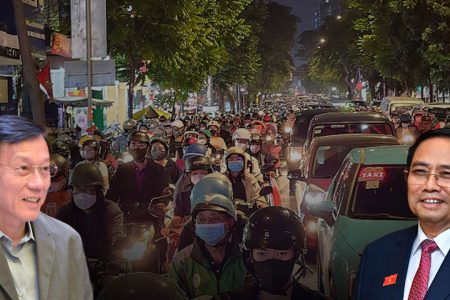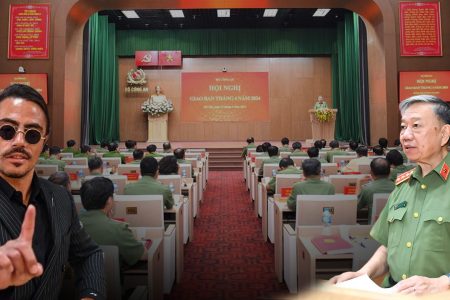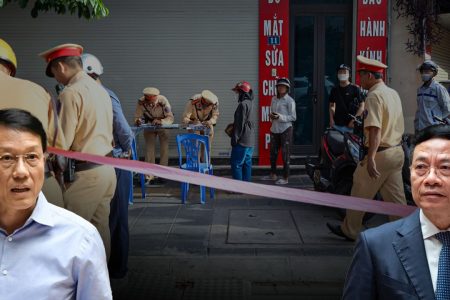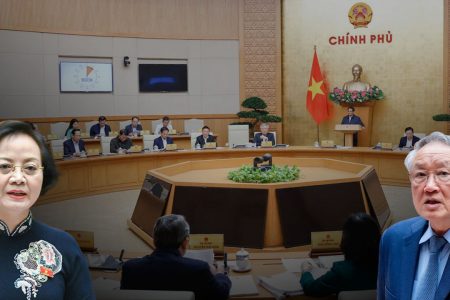
A situation that is difficult to explain in Vietnam today is that most civil servants, public employees and leaders in state agencies do not live on their salaries. Because the salaries are too low, not enough to cover and ensure the lives of themselves and their families.
But the question is, why, with salaries not enough to live on, do a large number of leaders and civil servants still own private houses or villas, and their children still study abroad?
State media reported on October 19, “Lieutenant General Tran Van Do: ‘Not everyone can be honest these days’.”
According to the article, on the morning of October 19, the University of Law – Vietnam National University, Hanoi, organized a discussion “Corruption preventive education with the requirement to build a culture of integrity in the new period.”
At this conference, Lieutenant General Tran Van Do stated that nowadays not everyone is honest, because integrity is not possible. He gave an example, “A judge’s salary is VND8 million, but the salary of a maid is more than VND8 million, so [officers] cannot have integrity.”
General Do’s statement reminds people of the character Chi Pheo’s exclamation to Ba Kien: “I want to be an honest person! Who let me be honest?”
Chi Pheo’s saying seems to only exist in literary works. Yet, after more than 70 years, in an era where Mr. Nguyen Phu Trong repeatedly affirmed, “… our country has never had the fortune, potential, position and international reputation as it does today,” exists again.
Perhaps, Lieutenant General Tran Van Do wanted to raise the issue to warn the government that public servants should be allowed to live on their salary, so that they do not need to be corrupt and still be able to survive.
The rule of human survival is “when you’re hungry, you have to see ways to feed.” Once the salaries of state civil servants are not enough to make a living, low-level officials will make difficult for public service users forcing them to give bribery.
The strange thing is, why is it that for the position of a lowly civil servant, with a salary of VND4-5 million/month, people are willing to spend hundreds of millions, even billions, to sit there?
As for the high-ranking officials – leaders in the state apparatus, even though they receive salaries and benefits from taxpayers’ money, they only focus on thinking about stealing and siphoning off the treasury to make it their own.
In any country in the world, to be a public servant, the minimum condition is to ensure a living wage, enough to support a family and children. Something that up to now, the Communist state of Vietnam, after 78 years in power, has not been able to accomplish.
When state civil servants’ salaries are not enough to live on, they have to make money by any means, including dirty work. The educational environment is the most obvious example, the school overcharges parents, teachers force students to take extra classes, and if anyone refuses, they will be immediately retaliated against. This is something everyone knows.
Not only in the field of education, but all other fields are in the same general situation. The common denominator is that the salaries paid by the state to civil servants are not enough to live on.
But in Vietnam, the more the government calls for reorganizing staffing, streamlining, and reforming the apparatus, more officials and employees will be in these agencies.
Vietnamese media has admitted, “For every 40 people, 1 civil servant is raised.” Accordingly, the current Vietnamese state apparatus has about 2.8 million officials, civil servants and public employees. On average, every 40 people raise 1 civil servant!
While in the US, the population is nearly 4 times that of Vietnam, but their civil servant team is only 2.1 million. That means, 160 Americans only have to support one civil servant, four times more than Vietnam.
Perhaps Vietnam’s state apparatus is the result of a state not elected by the people, although the government still claims that they are “a state of the people, by the people and for the people.” If so, that is just an irresponsible state.
Thoibao.de (Translated)




























